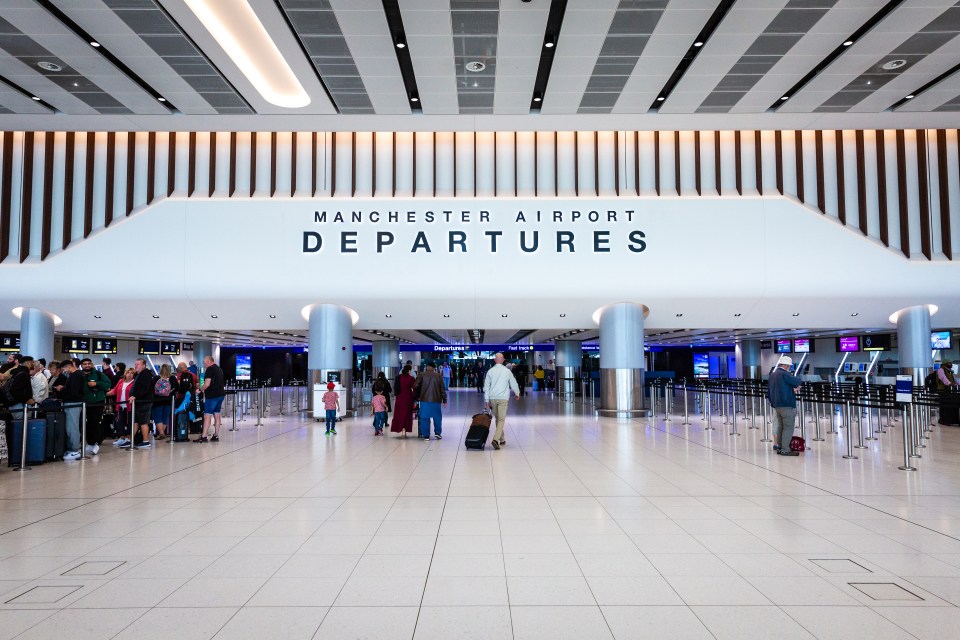Artist Poppy Jones has been reading Tender Buttons, the collection of Cubist poems by the early-20th-century American writer Gertrude Stein. “Her descriptions of everyday objects, and the combination of those descriptions of different objects, are really surreal and kind of create unexpected meanings,” she says.
Her own artworks take similar subjects: an egg, a jacket, a shirt. They also create unusual stories. Sometimes they are photographs of clothing, altered in Photoshop, printed on that piece of clothing itself, and then painted and marked with fingerprints. The result is part object, part still life, part surrealist composition – and part internal monologue.

We are sitting, together with Poppy’s artist husband Joseph, on the edge of an East Sussex meadow, wind blowing the long grasses, sun blinding, outside her black clapboard studio. It was built by Joseph and is in the back garden of the house owned by her parents, photographer Dafydd Jones and designer-maker Linzi Jones. Poppy and Joseph are softly spoken; the breeze keeps whisking words away. Conversation flows interchangeably between the personal, their work, their love of surrealism and modernism, the support of family, and the south coast artistic communities of Bexhill-on-Sea, St Leonards-on-Sea, Eastbourne and Hastings. “Good art asks multiple questions,” says Joseph at one point. “Whereas art that perhaps isn’t as successful might provide too much of an answer.”


The pair, both now 39, met while studying for an MA at the Royal College of Art, graduating in 2010. Poppy’s teaching took them to Falmouth in Cornwall, then to a 2015 residency at West Dean College, Chichester. Joseph’s lecturing then drew them closer to Brighton, where he still teaches; they now live down the coast in Eastbourne. In 2019 they had a son, Jude.
Poppy’s solo exhibitions in London, LA and Zürich have seen her work resonate with a wide audience. Her 2024 shows Solid Objects, at London’s Herald St gallery, and Frozen Sun, at Mai 36 Galerie as part of Zürich Art Weekend, were well received. “Jones’s lithographic, watercolour-embellished photo prints on suede and silk… have a charged, even eerie quality… [they] arrest time, but also have an uncommon exactitude and poise”, wrote critic Tom Morton in Frieze magazine. She is currently part of the group show The Shape of Things, Still Life in Britain, at Chichester’s Pallant House. A monograph is being published this autumn by Zolo Press.


“Poppy’s success is on a different level to anything I am doing, in terms of the number of people who want her work,” says Joseph. With her growing profile, and the childcare, it has only been since September, when Jude started school, that his work has gained significant momentum. “I’ve come out of a very long period of teaching,” he says. “I’ve always been making my work, but have maybe not been as motivated to show it.”
Joseph grew up in a very religious Christian family. Poppy lived with her artist parents in New York for several years when her father was working for Vanity Fair magazine. She is still close to them, and today they help with the childcare. Her family “have had a big impact”, says Joseph, through “their approach to creativity and their relationships to art and life”. Poppy adds: “Also the idea of being self-employed and not really knowing what’s going to happen next. That’s a very unstable way to live, and it was helpful for us to have my parents do that as well.”
Following Jude’s birth, Joseph took Poppy’s surname, switching from Long to Jones. “A fresh start in some ways, a shift” in terms of their family dynamic, says Poppy. “Maybe it’s like a new identity,” she adds. It’s also “a feminist act”, they agree.

An exhibition in May at The Artist Room in London’s Soho presented Joseph’s paintings of cats, so photorealistic as to seem surreal. The exhibition blurb cited Jean Cocteau: “I love cats because I enjoy my home; and little by little, they become its visible soul.” To this, Joseph adds: “I like the paintings to feel like you are looking through a window. Perhaps seeing your own reflection”. Following an August group show in LA at Ehrlich Steinberg, upcoming exhibitions include a solo presentation at Nada Miami with Roland Ross, and a group show at The Shophouse in Hong Kong in October.
While their work is very different, both cite shared inspirations, including Eileen Agar, Richard Hamilton and Marc Camille Chaimowicz. They also both create work as a counterpoint or commentary on our digital age of image oversaturation – both wanting to “slow the viewer down”, Poppy says.
Standing in her studio, Poppy becomes more confident. Her complex process, she says, makes it “hard to understand what you are seeing…” Is the final work a photo, a painting, a handmade object or an image of an object? “The way we view images now, especially the [volume] and the lack of questioning – they become these ephemeral things floating around.” With AI in the mix, “we don’t know any more”.


One might also ask – who are you seeing? Making the work, she says, “is very personal”. She speaks of one much-loved suede jacket that started to fall apart. She framed a section. “It felt like the textile itself was giving a lot of information… of a specific time period. And you can see my fingerprints on it.” She reworked it as a hybrid photo-painting-print. “It is in some ways autobiographical… It felt like I was expressing something of myself.”
Nicky Verber, founder and owner of Herald St gallery, says of Poppy’s work: “We live in a time when so much is demanded of still images – they have to fight for attention and are increasingly under pressure to be more than they are. In contrast, Poppy Jones brings new depth to quotidian images. The economy of her work favours the small scale: these pieces don’t try to overwhelm.”
“I don’t think you can make art outside of still life, portraiture and landscape,” says Joseph, sitting to one side of the studio on a stool. “What I find interesting is where they work like windows or mirrors. Portraiture is a mirror; landscape is a window; still life falls in between. You can look through a still life, but it also reflects back at you. There’s something kind of interesting there.”
We leave the studio and drive along overgrown lanes and beside the beach, through Bexhill-on-Sea, past the 1935 De La Warr Pavilion art centre, designed by Erich Mendelsohn and Serge Chermayeff. Joseph describes it as “a modernist spaceship that’s landed in the seaside town”. It’s a significant space for the couple: they eat at the café, meet artists and see exhibitions. “We have a real interest in modernism and histories of modernism. It’s a big theme,” says Joseph. “We’re kind of interested in modernism at the edges, like in Cornwall and Sussex. And the De La Warr is a very literal, physical embodiment of those interests.”

A short way beyond the town is Beeching Road Studios, set up by the district council to ignite the cultural and creative economy. It’s run by Flatland Projects, and is where Joseph has a small art space. “It’s amazing when you’ve got all these artists, you can create community pretty quickly,” says Poppy. “Loads of graduates who were going to London, getting fantastic degrees and skills, suddenly were coming back,” adds Joseph. It’s important to him to support and be part of the burgeoning art community.
“Poppy hasn’t seen some of this work,” he says when we arrive in his studio. Two small paintings of cats and one of a flower, created using images found on the internet, hang on the walls; another cat lies ready to be worked on; yet another sits propped up on the desk. “I’m trying to finish it, it’s not quite there,” he says.
In the car Joseph had described his work as playing with kitsch tropes. “They are all quite conceptual,” he says of his acrylic-on-canvas paintings. “Cats and flowers are divergence objects. People used to believe in God as a divergence. And I’m kind of interested in why people can become incredibly obsessive and compulsive and divergent about a flower or a cat.” He follows people who have posted as many as 20,000 pictures of each. Poppy says: “You’ve got the similar compulsion, but you’re expressing it in a slightly different way.” He replies: “If I had an answer as to why [people are obsessed with them] then I wouldn’t paint them.”
Milo Astaire, director of The Artist Room, says: “Joseph has the adept talent to render these overly saturated images into something fascinating, beautiful and surreal. His immaculate dexterity invites viewers to look closer and spend time with the works. This is his skill: he makes us look.”
The photorealism is “a way of thinking about the value of the object – it reflects the way that we think and look at and care for the world today”, says Joseph. “No one really knows what will happen to these 700 million images of cats that are on Instagram. I’m interested in what will last – like a pop art image of a Brillo pad.”






































































































































You must be logged in to post a comment Login